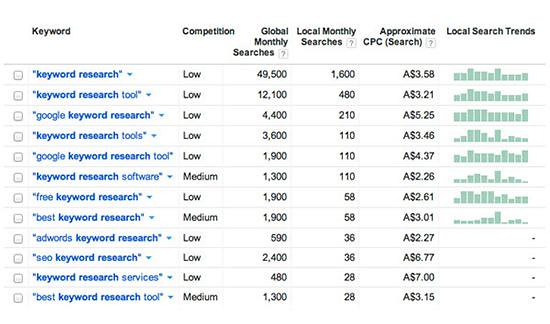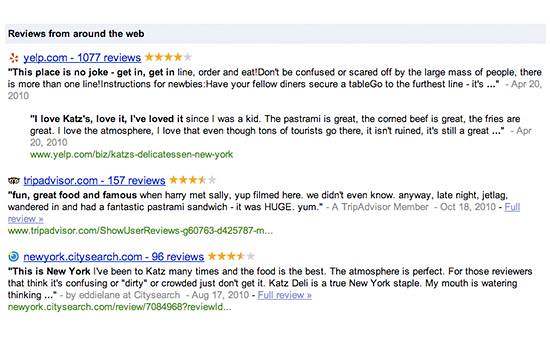Many brick-and-mortar businesses may have a steady flow of loyal customers, but they also need to have a stream of new people to get more revenue. But to achieve this, keeping your website up-to-date and consistently working to improve your SEO strategy are needed to ensure that your company is getting the exposure it needs to thrive.
As a rule of thumb, local businesses need local SEO as part of their marketing strategy. Outlined below are the steps that your company should take to properly optimize their websites for local searches.
1. Do Consistent Keyword Research
Researching the most commonly used keywords for your niche is the very first step of the sales cycle. Using keyword research tools such as Google’s Keyword Tool (which is freely provided if you register for a Google AdWords account) allow you to enter a main keyword phrase and get the most popular keywords related to it. The tool also shows how many times a keyword phrase has been used, so you can know whether it can generate enough traffic for your website.
Keep in mind that main keywords phrases (e.g. “digital marketing”) usually have more competition due to many websites trying to rank for them. Optimizing your website for long-tail keywords (which are naturally more specific – e.g. “how to choose a digital marketing company” or “tips for choosing a good SEO company”) is a good way to rank higher in search engines. And since we’re talking about local SEO, you may want to include the location of your business in the keywords that you’re trying to rank for – e.g. “digital marketing services in London.”
The key to proper keyword optimization is to understand the common terminology used by your target audience to search for your website. If your website is about bodybuilding, you will want to optimise your content for “how to grow muscle mass” rather than “how to bulk out” – a term that is commonly used by industry experts and professional bodybuilders, not regular fitness junkies.
2. Invest in On-Site and Content Optimization
Brick-and-mortar businesses trying to rank higher in search engines need to publish quality content that’s highly informative and engaging for their audience. But instead of writing keyword-focused content, you should write topic-focused content that is correctly optimized for the keywords you have identified at the previous step.
Keyword stuffing usually comes along with a Google penalty, not to mention that customers are more likely to abandon your website if portions of your content don’t make much sense or look as if they have been mechanically written.
Consider including one or two references as to where your business operates throughout the content to stand a better chance at showing up in search engines whenever a nearby customer searches for your company. For example, a long-tail keyword such as “digital marketing services in London” or “London digital marketing services” is more likely to show up in search engines than just “digital marketing.”
In addition to content, you must also optimize meta titles – they should include one relevant keyword as close to the front as possible, be unique, and entice users to access your website. Don’t forget that your meta titles will also show up on social networks, so optimising them can land you new visitors that can quickly turn into loyal customers.
Creating and optimising meta descriptions is another step you should take. Although search engines no longer consider meta descriptions as part of their ranking algorithm, these texts can help you drive traffic by giving users an idea about what a page or post is about right from SERPs. They should be optimized for a long-tail keyword, be under 140 characters (spaces included), and encourage people to visit your website to read more.
You will also want to get the most of your “Contact Us” page, so be sure to offer accurate contact information (name, phone number, email address, fax) and the actual geographical address of your company instead of a P.O. Box to ensure that Google will list your website whenever a customer in the same area searches for you.
3. Get Listed in Google Local
Google My Business is probably one of the most useful tools brick-and-mortar companies can claim when trying to rank in local searches. By signing up for Google My Business, your company’s info will be displayed on Search, Maps and Google Plus so your customers can easily find you.
Whenever your prospects search for your company or specific products/services in your area, they will be able to see your address, phone number, hours, Google Plus reviews, directions, average rating, and even other local listings where your company has been reviewed. Moreover, your listing will also show up on the map for easy location reference.
And once you have a Google My Page listing for your business, your customers will be more likely to review their experience – which leads us to the following point.
4. Get Genuine Reviews
It’s generally agreed that the more reviews a company has, the better chance they stand at generating leads and sales. The complexity of the reviewing process is oftentimes what causes customers to abandon their initiative.
Kindly ask your customers to review your company and give them a couple of options for doing so. Your focus should be getting them to leave a review on your Google Plus page, but they should be able to use other services as well if they don’t currently have an account – for example, Yelp.
By giving them several options, you will get more results. Many may not have a Google+ account, or they may not want to use their Facebook profiles to provide feedback, so the more options they have, the better.
Never attempt to ask for fake or specifically positive reviews. To build credibility, your reviews need to be genuine and written by customers who have truly enjoyed working with you. If they aren’t genuine, they may stand out, making your trustworthiness appear questionable in the eyes of your prospects.
5. Have a Strong Social Media Presence
On top of Google+, there are some other big players of the social media industry that you should optimise your website for: Facebook, LinkedIn, Twitter, even Pinterest and Instagram if the nature of your business allows. Make sure that you include your physical location (full address with state and city included) on each social media profile you have to increase exposure.
Keep your contact information consistent across all platforms to ensure that customers can easily find you.
One trick you can use to drive more traffic is listing your Facebook page as a local business to encourage customers to check in, so you stand a chance at showing up toward the top of SERPs.
Final Word
Integrating local SEO as part of your SEO strategy is of paramount importance if you want to increase brand awareness and develop a solid base of nearby customers. Even if you’re competing with other companies that have been in business for a few years already, you can easily outshine them if you optimize for local searches.
With the right strategy and initiative, your business will soon become genuinely popular in your area, enticing more people to choose you over competition.
Joe Ryan is an online marketing expert who founded Digital Search Group, an online marketing agency in the UK. He specializes in creating effective online marketing strategies for his clients as well as help them build a their brand. In his free time, he likes to travel and spent quality time with his family.

